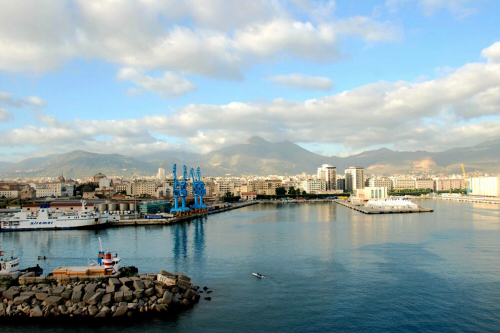The Mediterranean: The Devil and the Deep Blue Sea
地中海:魔鬼和那湾蔚蓝深邃的海
History’s most important sea
最富有历史意义的海
The Great Sea: A Human History of the Mediterranean. By David Abulafia. Allen Lane; 783 pages; £30. To be published in America in September by Oxford University Press; $34.95. Buy from Amazon.co.uk
《伟大的海:地中海的人文史》 大卫·阿布拉菲亚著。Allen Lane出版社出版,783页,定价:30英镑。将于今年九月在美国由牛津大学出版社出版,定价:34.95美元。
David Abulafia’s marvellous history of the Mediterranean is an excellent corrective to oversimplified views of geopolitics. Some people home in on distinctive landmasses, an island such as Crete or a clear shape like Iberia or Anatolia, and assume these have long formed a single cultural or political space, embracing coast and interior, and different from places “across the water”. At the other extreme, romantic types regard a lake or sea as a friendly space where ideas, expertise and merchandise are traded to perpetual mutual advantage. The second view is the more likely. True, the various ports and shores of the Mediterranean influenced one another (if war is regarded as a form of influence), but the impact of hinterlands and of distant powers, like Russia and America, was also huge.
大卫·阿布拉菲亚所著的这本对地中海历史的杰出著述是对那些过分简单化的地缘政治观的绝好纠正。有些人将注意力集中于特定的地块,像是克里特岛这样的某个岛屿,抑或是诸如伊比利亚半岛或小亚细亚半岛等具有清晰轮廓的地理区域,并且主观臆断这些地方很久前就形成了单一的、包括海岸和内陆的、不同于“地中海对岸”那些地区的文化或政治空间。这是一个极端。而另一个极端则是那些饱受浪漫主义熏陶的人则把湖泊或海洋视为思想、技能和货物获得交流从而使交易双方都能恒久受益的宝域。后一种观点更接近现实。的确,地中海沿岸的诸多港口和海岸相互影响(如果战争也被视作一种影响的话),但是内陆地区和那些距离地中海路途遥远的大国,如俄国和美国,其影响力亦不可小觑。
Marshalling a vast array of intricate detail, Mr Abulafia takes the reader from the age of the Phoenicians and Trojans to the advent of modern tourism. He distinguishes epochs when the sea was kept safe by a single power – the Roman empire, the Royal Navy or the Sixth Fleet – from periods of intense strategic conflict and from times of free-for-all between small powers, slave-traders and pirates.
通过梳理大量错综复杂的细枝末节,阿布拉菲亚先生在本书中带领读者从腓尼基人和特洛伊人的时代一直走到现代旅游业的出现。他把这段历史中各个单一强权独自统治地中海并维护其安宁的时代——无论是罗马帝国、英国皇家海军还是美国第六舰队——跟那些存在着激烈的战略冲突的时代以及各小国,甚至是奴隶贩子和海盗对这片海域展开开放式争夺的时代区分开来。
In most phases of history, Mr Abulafia shows, the Mediterranean was a net exporter of economic and cultural might. In the Middle Ages, for example, city-states in present-day Italy or Spain traded from a position of strength with north European suppliers of textiles and north African sellers of gold. They also established bases in the eastern Mediterranean, exploiting Byzantium’s decline, gaining access to merchandise from farther east. In the modern era the Suez Canal reduced the role of the sea to that of thoroughfare, between the Atlantic and Asia.
阿布拉菲亚先生在书中阐明,地中海地区在大多数的历史阶段都是经济力和文化力的净输出地。比如,在中世纪,坐落于今天的意大利和西班牙境内的那些城市国家在跟欧洲北部地区(注:作者这里指的不是今天的北欧国家,这是的“北”是相对于意大利和西班牙而言的,指的是当时的尼德兰、佛兰德斯和英格兰等地区。)的纺织品供货商和北非地区的黄金贩子交易的时候是处于强势地位的。他们还趁着拜占庭帝国的衰落在地中海东部地区建立了一些基地,从而获得了从东方世界输入的商品。历史进入现代后,苏伊士运河的开凿降低了地中海的地位,使其更多扮演了连接亚洲和大西洋的海上走廊的角色。
Mr Abulafia enjoys using arcane detail to bolster his arguments. Explaining the rise of Barcelona as a naval power to rival Italian city-states like Pisa and Genoa, he notes the balanced diet of Catalan sailors: more biscuit and cheese than the Venetians, less wine than the Neapolitans, but plenty of garlic, onions and spices to make hard biscuits more palatable.
阿布拉菲亚先生喜欢用鲜为人知的历史细节来支持他的论点。在解释巴塞罗那何以崛起成为一个能与比萨和热那亚等意大利城市国家抗衡的海上强权时,他提到了加泰罗尼亚水兵们平衡的膳食结构:他们比威尼斯人吃更多的饼干和奶酪,但喝酒却比那不勒斯人少,同时他们吃大量的大蒜、洋葱和调味品使得生硬的饼干吃起来更加可口。

Choosing his superlatives carefully, he concludes that the Mediterranean has been “the most vigorous place of interaction between different societies on the face of this planet”. Indeed, its role in the history of civilisation has “far surpassed [that of] any other expanse of sea”. But as the book makes clear, these interactions were not always mutually beneficial.
这位在使用最高级的时候慎之又慎的作者认为地中海一直是“这个星球上不同社会之间相互影响最为积极活跃的地区”。的确,地中海在人类文明史上的地位已经“远远超越了任何其它海域(的地位)”。但是就像本书阐明的那样,这些相互影响并不总是对双方都有益的。
The cargoes transported across the Mediterranean included terrified slaves and prisoners (like the apostle Paul, whose ship was smashed to pieces) as well as exotic spices. Voyages, whether military or commercial, were undertaken in a spirit of ruthless calculation, not open-hearted adventure. Despite the warm feelings it now evokes in north European hearts, as a locus of healthy food and blissful ecology, the Mediterranean is a perilous place for sailors. In winter, storms can brew up fast and rage for days. That is one reason why Mediterranean people who make their living from the sea do not share the romantic emotions of those who splash about for fun. Indeed before the age of tourism not many littoral folk learned to swim; the risk of drowning was too high.
通过地中海运输的货物既有来自异域的香料,也有担惊受怕的奴隶和囚犯(例如耶稣的门徒保罗,他乘坐的船触角沉没)。彼时在地中海上的旅行,无论是军事性质的还是商业性质的,都是一种无情的深思熟虑而非敞开胸怀的冒险精神下进行的。尽管今天居住在欧洲偏北部地区的人们都对地中海怀有一种好感,把它看作是健康食品和优良生态的处所,地中海对于海员来书仍然是一个危险四伏的地方。冬季的风暴不仅说来就来而且能持续数天。这是那些靠海吃饭的地中海渔民们缺乏来此玩水嬉戏的游人对这片海域所怀有的浪漫感情的原因之一。的确在大规模旅游业时代到来之前,海边居民中学会游泳的人并不多,因为在海中溺水身亡的危险性太高了。
Cross-fertilisation between cultures and religions did, of course, take place, often despite the efforts of secular and religious leaders to stop it, or to ensure that influence only flowed one way. In Tunis you can see the tomb of a Majorcan friar who studied Islam in Bologna and then moved to north Africa where he became a learned and distinguished Muslim.
尽管经常受到来自世俗和宗教领袖的阻碍,以及他们试图确保影响力单方向起作用的努力,地中海地区不同文化和宗教间仍然实现了相互交融。在突尼斯你能见到一位马略卡修士的坟墓。他曾在博洛尼亚学习伊斯兰教,后又来到北非并成为一名博学而显赫的穆斯林。
Mr Abulafia notes with approval that Sephardic Jews, such as his own forebears, forced to leave Spain for Ottoman Smyrna, have been especially open to integration with surrounding cultures. Whereas modern Judaism celebrates the Jewish revolt against the Hellenised dynasty that ruled the Levant, Mr Abulafia prefers to focus on Alexandria, where there was a more productive symbiosis between Hellene and Hebrew. Its fruits include a great Greek translation of the Hebrew scriptures and Philo’s brilliant exposition of Jewish metaphysics – written in Greek.
阿布拉菲亚先生在书中对那些被迫离开西班牙前往奥斯曼帝国控制下的士麦那的瑟法底犹太人(包括作者本人的祖先)做出了肯定,认为他们尤其乐于融入周围的文化。现在的犹太教纪念犹太人对那些曾经统治地中海东部的希腊化王朝的反叛,阿布拉菲亚先生却选择将目光转向埃及亚历山大港,那里的希腊人和希伯来人曾经和睦共处并创造出很多文化成果,包括希伯来语经文的一个伟大的古希腊语译本和斐洛以古希腊语写成的对犹太人形而上学思想的杰出阐释。
Mr Abulafia is too conscientious a historian to speculate much about the future, or even to prejudge how the modern age will fit into the sweep of Mediterranean history. But using his analytical tools, it is surely possible to sketch out a rather dark outlook for the sea, thanks not just to the ebbing of European power but to avoidable crises of governance and demography. As things stood until recently, an unhealthy sort of system linked northern and southern Europe, with subsidies and tourist euros from the north helping to mask and preserve dysfunctional politics and sclerotic societies south of the Alps.
阿布拉菲亚先生作为一位认真负责的历史学家并没有在本书中对未来作出过多猜测,也没有对目前这个时代将在整个地中海历史中所处的位置作出预判。但是利用他的分析工具,我们肯定可以为地中海勾勒出一个黯淡的未来,这不仅是因为欧洲的衰落也是由于本可避免的治理危机和人口危机。直到最近,把欧洲北部地区和南部地区联系起来的是一种不健康的体制。在这种体制下,欧盟补贴和来自欧洲北部的游客给当地带来的收入帮助掩盖并维持着阿尔卑斯山以南地区一潭死水的政治和僵化的社会。
An even less healthy dynamic connected Europe as a whole with north Africa: the European Union absorbed some of the Maghreb’s surplus labour, while helping to prop up the region’s authoritarian regimes. Both those political ecosystems are now collapsing, with the euro-zone crisis, the advent of Arab people power and the war in Libya. The crises present a challenge to both regions; the Maghreb needs to loosen political control and strengthen its institutions and Europe must support such moves, both politically and economically. Failing to seize the opportunity may result in the flow of desperate people northward becoming uncontrollable. That may not be so unusual when set against three millennia of conflict in the Med. The worst outcome would be for Europe and north Africa, both losing relative weight in the world, to reinforce one another’s decline. That would be a lamentable fate for the “Great Sea”, invoked in a Jewish prayer which gives this book its title.
将整个欧洲与北非联系起来的则是更加不健康的体制。欧盟吸收了北非地区的一部分过剩劳动力,与此同时也成了支持该地区专制政府的帮凶。这两种政治生态系统眼下都随着欧元区债务危机,阿拉伯人民力量的觉醒和利比亚的战事而轰然倒塌。这些危机无论对北非还是欧洲都是一种挑战。北非需要放松其政治控制并加强制度建设,而欧洲则必须从经济和政治上予以支持。如果不能抓住这个机会的话,结果可能是绝望的民众大量向北涌入欧洲而无法控制。放在地中海三千年的冲突历史中来看,这或许并没什么大不了。最坏的结果是在世界舞台上相对实力日益衰落的欧洲和北非互相之间加剧对方的衰落。这样的命运,对于地中海这一“伟大之海”——这个称谓来源于一则犹太祷文,同时也是本书书名的来源——来说,将是令人扼腕的。
英文、中文版本下载:http://www.yingyushijie.com/shop/source/detail/id/588.html








